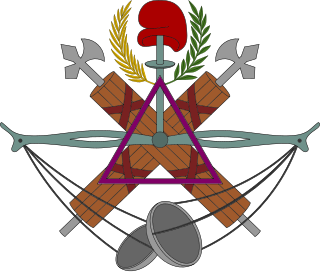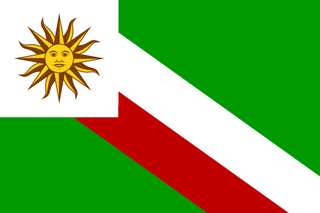
Jorge Majfud is a Uruguayan American professor and writer.

Gaucho literature, also known as gauchesco ("gauchoesque") genre was a literary movement purporting to use the language of the gauchos, comparable to the American cowboy, and reflecting their mentality. Although earlier works have been identified as gauchoesque, the movement particularly thrived from the 1870s to 1920s in Argentina, Uruguay and southern Brazil after which the movement petered out, although some works continued to be written. Gauchoesque works continue to be read and studied as a significant part of Argentine literary history.

The Radical Republican Party, sometimes shortened to the Radical Party, was a Spanish Radical party in existence between 1908 and 1936. Beginning as a splinter from earlier Radical parties, it initially played a minor role in Spanish parliamentary life, before it came to prominence as one of the leading political forces of the Spanish Republic.

The National Party or Montt-Varist was a Chilean political party formed in 1857 as a split from the Conservatives by the supporters of President Manuel Montt and Interior Minister Antonio Varas. The National Party had a liberal-conservative ideology and was primarily supported by middle-high businessmen, bankers and journalists. The Welsh-born Edwards family was a bigger financer of the party, along with the aristocratic Balmaceda, who was linked to the Liberal Party. The party never was more than an influential third party, and since the late 1910s its influences declined considerably, stopping from participating to national elections after 1924, finally merging into the United Liberal Party in 1933. The monttvarista National Party is not to be confused with the National Party formed in 1966.

The Legislative Palace of Uruguay is a monumental building, meeting place of the General Assembly of Uruguay, and the seat of the legislative branch of the Uruguayan government. It is located in the Aguada neighborhood of Montevideo.
Javier Paniagua Fuentes is a Spanish writer and politician for the Spanish Socialist Workers' Party (PSOE).

Leonardo Garet is a Uruguayan writer, teacher, and member of the National Academy of Uruguay.

Roger Bartra Murià is a Mexican sociologist and anthropologist. He is the son of the exiled Catalan writers Agustí Bartra and Anna Murià, who settled in Mexico after the defeat of the democratic forces in the Spanish Civil War. Roger Bartra is recognized as one of the most important contemporary social scientists in Latin America.

Ángel Canaveris was an Argentine pediatrician and psychiatrist, who had a preponderant role in the beginnings of Uruguayan Medicine. He served in Montevideo as general director of the Hospital Vilardebó and Hospital Maciel.
Benjamín Nahum is a Uruguayan historian, professor, and researcher.
Amparo Menéndez-Carrión is an author and a scholar specialized in comparative politics and Latin American studies. She received her BA in Political Science at the University of Minnesota and her M.A. and Ph.D in International Relations and Comparative Politics at The Johns Hopkins University School of Advanced International Studies. She was Director General of FLACSO Ecuador for two consecutive terms (1987-1995) and has been a professor at the University of Chile and Macalester College. Her book La Conquista del Voto en Ecuador was declared by her peers ‘Best Book of the Year in the Social Sciences’. Her most recent book was recipient of the Bartolome Hidalgo award for non-fiction book of 2016 in Uruguay.
Carina Perelli is an international expert in elections, constitutional arrangements, governance, security and defense related matters. She was executive vice-president of IFES and also the former director of UN Electoral Assistance Division between 1998 and 2005.
Mercedes Rein was a Uruguayan writer, translator, and dramatist.
"Carrera de bicicletas en el velódromo de Arroyo Seco" is a documentary short produced by director Félix Oliver. It is considered the first Uruguayan film. The only known copy is preserved in the archives of Cinemateca Uruguaya.
Gonzalo Álvarez Chillida is a Spanish historian. He has been referred to as the leading Spanish expert in the study of antisemitism in Spain.

Leonardo Haberkorn Manevich is a Uruguayan journalist, professor and writer.

Graciela Sapriza is a Uruguayan historian and educator. Her research focuses on the social, political and cultural participation of Uruguayan women in the 19th and 20th centuries.

Suzana Prates was a Brazilian feminist sociologist and academic. She spent most of her professional career in Uruguay where she dedicated her life to national and Latin American feminist thought. She was the founder of the "Centro de Estudios e Informaciones del Uruguay" (CIESU) and, at the end of the 1970s, she founded the "Grupo de Estudios sobre la Condición de la Mujer en Uruguay" (GRECMU). Her colleagues included Julieta Kirkwood and Elizabeth Jelin.

Ruralism is a right-wing traditionalist political ideology in Uruguay.
The Naval Club Pact was an agreement between the authorities of the military junta of the civil-military dictatorship of Uruguay and representatives of the political opposition. Secretly agreed on on August 3, 1984, at the naval club in the Carrasco neighborhood of Montevideo, it laid the foundations for the transition to democracy in the country.











